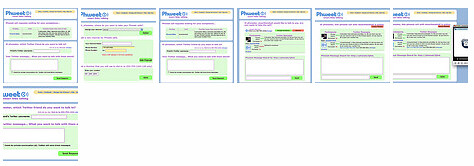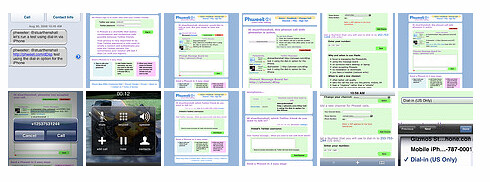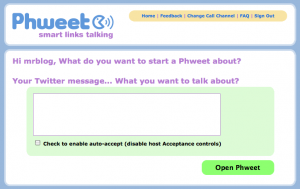Phweet Review – Your Suggestions Wish
Wednesday, December 31st, 2008This posting is on my personal blog too. I’ve purposely not pushed the @phweet messages or the updates on the Phweet blog while we are in Alpha. The learning has never stopped. I also thanked many people that made Phweet a success yesterday. Looking forward to your continued support and a Happy New Years wish to all Phweeters!
Some things are Phweet! Ah sweet! At least that’s the play on words I was looking for. I thought a world full of PhweetTalk might make Twitter a more interesting place. So this is my review.
10 things I have learned:
We haven’t yet changed the world. People still prefer to make their calls off or outside Twitter and without Phweet. While we garnered a lot of early attention the reasons why are not that hard to see.
1. Most importantly Phweet works. It breaks new ground re callerID, context for a call, call in progress, and call records. The variations developed later including persistent Phweets have even more potential.
2. However, Twitter isn’t yet a mature or effective signaling system. There’s lots of confusion around @ messages, DM’s and the default settings for notifications and email. Many times we wished we had the money to enable reliable SMS and email notification services ourselves.
3. I still look at Phweet as a Clayton Christensen type innovation. It’s counter intuitive, disruptive and slightly broken in the beginning. But watch out!
4. We thought the “PhweetURL” in the tweet would be more viral than it was. At first it was. We had a dozen people in our “launch call”. However sharing and promoting URL’s on twitter isn’t as easy as it sounds or may look. Signing in to Twitter was also a barrier. Twitter really needs an oAuth identification service. Twitter should authorize and send Phweet the key. We also had too many public canceled sessions so the user didn’t get a reward.
5. Tweeters do talk. In fact Twebinars prove they also like conference calls. Yet our lack of an app integration made this hard to call in. We also didn’t put in a “billing system” in the Alpha which restricted the “convenience that can be made available. A few of us know. We ran PSTN accounts and the integrity and convenience of the system improved.
6. We failed to get one Twitter App developer on board. They could have integrated Phweet using the API so it was almost like having a Twitter buddy on speed dial although without the rude ringing. This was disappointing to us. I never wanted to be in the App business although (if I had the funds) we could develop two or three twitter related apps that would challenge the current leaders on the desktop and mobile. I believe we presented revenue models and options that should have been attractive. My guess is many different agendas.
7. We have built a really nifty personal call management system. You can take the call on any channel and Phweet is effectively channel agnostic. Still the feature was buried for first time users and without a payment plan we couldn’t fund the calls so the host always got a call back. That’s a problem we’ve now solved alas it awaits another iteration.
8. Many don’t see the potential for the anonymity / callerID that is and separation from the phone number. This is integral to effective location based services and managing your privacy.
9. Similarly, we’ve not yet executed an integrated package that puts the receiver in charge. Many still fail to see that traditional call escalation results in interruptions, voicemail and potential breaches of privacy. By contrast Phweet lets the receiver make a judgment based on context and their relationship whether or not to escalate to a call. We’re already doing this unofficially by texting first. Phweet must make that dumb SMS message smart.
10. The PhweetURL was always meant to become invisible. In time it will. It’s really an exchange contract that brokers and escalates access between two or more parties. It may be public or private. Without apps we could make the Phweetman the button we envisage or enable it to go to every web page. Again we know the next step.
There’s more of course. We’ve looked at statistics, we’ve looking as deeply as anyone into twitter user behavior. For now we didn’t get a million users quickly. That’s not to say I can’t see 10+ million in my future.
What I would do differently
I wouldn’t have launched a public alpha. There were huge benefits and yet I think we may have done better with building out business case privately. When that public alpha launched, the perception was we were too big really for angels and we needed to go for something bigger. Fact was we were perhaps somewhere in between. As a consequence we shot too high too fast when we had a million demands at once. So I would have spent the time sharing it with more of those I trust and know. No one told me this privately although a couple of influential bloggers who I’d have called my friends shunned mentions as if they had been slighted. It was never the objective. We did what we thought was best at the time and prepped it. I couldn’t see at the time how I could run an effective alpha. Part of our initial focus was to learn how a Phweet passed through the twittersphere. Many of my best friends weren’t even on Twitter despite my early advocacy. So this is really a catch22 reflection. Still it is a note for future iterations.
I spent hard earned money on help with the look and feel of the site. If we hadn’t gone to public alpha we could have saved this money and in the end it was more trouble than it was worth. It’s always an interesting trade-off. It’s also part of the set of skills that’s required to get a start-up like this off the ground. In reality I’m still much happier we spent some time on the “packaging” my real frustration is not having the resources to make improvements. Like anything you have to be prepared to throw it away. Still as they say. Nothing ventured nothing gained. Just two guys had real skin and labor developing Phweet.
In both my reflections on 2008 and in the above I wish we had started with a few more resources. I felt close at the time it just didn’t quite gel that way. I’m sure David feels the same way. Both of us are capable of driving more than just ourselves. I still look at it with pride and think if this is what we could do just think what a team of 10 could do. It’s not a question of delegating everything; its more about ensuring everyone is doing what they are best at. I found myself caught in trying to do everything. The simple fact is few startups or web solutions start with so few resources and even less that provide VoIP solutions. Most have a small army.
If it is not clear in the above I would approach funding differently. I’m a little horrified that I’m still stuck on really moving forward because of a complete lack of funds. Having sold big dollar consulting projects the costs to have driven our Phweet team forward could have already paid out many times over in some large organization with more resources. Still that’s not the prize that a startup VC or Angel looks for. I’m convinced that the ROI can be huge.
The future for Phweet
That will be a separate post. It’s dependent on and requires additional support from my friends. I require encouragement. So does David. We have a good understanding of services that we can harness in
the next iteration. Our plans for Phweet won’t be beholden to “minutes” which is a death spiral for most VoIP companies.
What would thrill me the most and best kick start my new year would be your suggestions; public or private. So if it was yours… what would you do next? If you are as passionate as I am and want to press the innovation boundaries then join us, advise us, fund us etc. Certainly, now would be a good time to come forward.
Communications is Fragmenting
Wednesday, October 8th, 2008The next time you use Phweet I’d like you to consider how it improves communications in a world that is rapidly fragmenting.
- We want Multiple Identities: Our directory listings are increasingly fragmented, outdated and dispersed. Where once a white pages or yellow pages listing was enough we now have profiles on social networks, corporate profiles, personal websites and more. Each serves a different purpose, each a different share and a different way of revealing ourselves. No one wants one identity for all communications anymore!
- We use Multiple Channels: Communications channels are often not synchronized or updated. It’s a guessing game where you will find me. This results in lost opportunities and failures. The fact is you don’t know my number anymore anyways. You click on a name in your address book or an IM handle and we talk. The end point doesn’t matter. What matters is that the communication channel is a good connection and that it costs nothing or almost nothing. More importantly why should you have to judge or guess where to send the message or make the call.
- We want privacy without Interruptions: Sharing your mobile number may result in unwanted interruptions. Routing all calls to your mobile is the future. The problem is interruptions. If I give you my mobile number and you share it there is no way for me to ‘expire’ that connection and I may suffer further breaches of privacy. As a result, we are often highly protective of our mobile numbers. When it gets really bad people get a new mobile number. That’s not a solution.
- Desire control over access: Callers dictate when the calls happen without context and often without identification. It’s even worse as I wrote yesterday when it is an unknown number calling. We send those to voice mail and then may later have to listen to it or clear it. Let’s face it SMS is more and more popular for setting up calls and the “Available”, “Away” etc. that we have seen on IM accounts has become almost irrelevant.
- Broadcast and escalate conversations: It is hard to spontaneously escalate calls to conferences particularly if people are on different networks. This is one of the things that has always impressed me most about Skype and moving Skype multichats to conference calls with three to five people. We’ve enabled this with Phweet without number exchanges in multiple formats. You can even broadcast what you are talking about in real time. The future where you control the bridge and determine the services on the bridge is here. It’s a key differentiator. There’s more controls and power we will be offering to users.
- Communications on-the-move: Location based services are limited by access to numbers and concerns about sharing proximity info. The future is not going to be limited by the cost of the call or the need to know the communications channel. It should be about whether or not I want to allow access to me and under what circumstances and context I am willing to share. I feel I will share different profiles / directory listings and broadcast them to different destinations. The status update is key and so are my public profiles. At the end of the day it is my directory listing that will put you in touch with me. My listings on the move may be many and varied. They may or may not relate to each other. That’s fine by me.
I beleive Phweet addresses communications in a fragmenting world. We still have a way to go. Let me know which of these items are important to you. Which one’s you think really make a difference. If you were Phweet how would you use these attributes to move forward? Look forward to your comments.
Phweet Coffee Talk Cafe
Thursday, September 18th, 2008We have a new type of Phweet. It’s a watercooler or “Coffee Talk Cafe”. How’s it different? Like all Phweets it ties the conversation to a URL. However in this case it is persistent and creates a different type of communication experience.
Have you ever..
- needed a talking place where people can come and go? A virtual watercooler or VoiceIRC.
- wanted to have an hangout or virtual cafe to visit for talking and chatting with friends or family?
- worked from home and just wished you could drop in to a conversation?
- been part of a group of experts or help desk that answer customer inquiries?
- wanted to run a open focus group around a discussion item
- had to manage disaster management and needed a quick point of contact?
- invited people to talk about a topic?
- run a 24hour talkathon?
Now you can set up your very own Phweet Coffee Talk Cafe in less than a minute. Then invite your friends and colleagues and watch the conversation grow. Each time someone joins “visits” you will get a direct notification from @phweet with the name of who joined and and you can jump into session with them. At first you will want to do this everytime. But later when others are jumping in and you are busy you may just want to skip it. From time to time you may want to promote your URL and bring new people into the conversation.
We need your feedback. Tell us how you want to use it. Help us make it better. (more…)
Testing new Phweeture – Undirected Phweets = "Coffee Talk"?
Saturday, September 6th, 2008Phweets are normally directed to a specific individual, the recipient, and the Phweet live exchange does not begin until the recipient accepts the request. We are testing a slightly different kind of Phweet exchange, that we’re calling an “Undirected Phweet” until we have a better name. An “undirected” Phweet is one that is not sent to any one in particular. It is a Phweet URL that is created and immediately made active for others to join. The URL stays active until the host (creator of the Phweet) ends it. However, unlike normal (directed) Phweets, the “undirected” Phweet URL stays active even if the host leaves (but does not “end”) the Phweet URL. Participants may use the URL and continue their conversation even if the host is not present. All “undirected” Phweets are “public” – that is to say they do not use “d” messages.
Undirected Phweets can be started in “auto-accept” mode where any visitor to the URL is “auto-approved” and immediately joins the Phweet. The host can still “kick” them out. Otherwise, normal request/approve controls are in place, where the host must approve (once) those users that want to join, the same way it works for normal Phweets. Hosts can also create the Phweet URL with normal host acceptance controls, and then “invite” specific users to join, sort of like a “broadcast”, which essentially pre-approves those specific users, but still requires anyone else to ask to join and to be approved by the host.
Perhaps we should call these kinds of a Phweets “Coffee Talk” from the SNL skit where the Linda Richmond character would introduce a topic, such as “The Progressive Era was neither progressive nor an era” and then say “Discuss.”
This new feature is not formally launched yet, but is available for testing. To create an “Undirected Phweet” sign in to Phweet.com and use this link: http://phweet.com/phweetup.cgi
Try it and give us some feedback about what you think this feature needs.
Dial-in to Phweet – Use Your Phone
Saturday, August 30th, 2008You just received a Phweet and you don’t have a mic or headset available. You don’t want to decline you simply must take this talk request. Never fear.. just dial-in and make the connection. Phweet makes it easy to “dial-in” and accept calls rather than taken them on your PC. You can call in with any phone that will display an accurate callerID.

Dial-in to Phweet and use your phone or mobile Phweet Detail Step by Step with instructions.
Dial-in to Phweet Slideshow (turn ‘info on”) This is the same show below with instructions visible.
Using Gizmo5 with Phweet
Saturday, August 30th, 2008The TringMe flash widget makes it easy to take Phweet calls on any PC without downloading anything. In many ways it is the ultimate in convenience until you want to start hosting Phweet sessions yourself or simply want to free yourself from a headset and start using a phone. The other downside of the practicality is you may pop in and out of the Phweet session for a few moments while you invite others or even accidentally close your browser tab.

We have many more solutions and choices on the way. My first SIP share uses Gizmo5 a SIP based client that embraces open telephony that has been around almost as long as Skype. The way we use it gives it new meaning. You won’t need to add any buddies or new contacts. You will just need an account setup. Then you will find the audio quality improves and you gain new opportunities to direct calls to where you want for just a few dollars.
Gizmo5 and Phweet Detail Step by Step with instructions.
Gizmo5 and Phweet Slideshow (turn ‘info on”) This is the same show below with instructions visible.
Using Phweet Dial-in on the iPhone
Saturday, August 30th, 2008So you want to use Phweet on your phone? You’ve just received a Phweet notification from Twitter via SMS. A Twitter friend wants to talk to you! This set of instructions will get Phweet working on your iPhone.

iPhone and Phweet Detail Step by Step with instructions.
iPhone and Phweet Slideshow (turn ‘info on”)This is the same show below with instructions visible.
Phweet Founders on Squawk Box
Tuesday, August 26th, 2008Founders David and Stuart share their perspective on Phweet and what makes it different, in a broad-ranging discussion triggered by Andy Abramson’s smart little experiment using Phweet on Aircell.
Download the podcast or play in pop-up.
The discussions included a broadranging technical disucssion that has been further fullowed up. Here’s two illustrations – Dan York tells us why you can use Phweet when Skype is blocked and TringMe’s CEO Yusuf Motivala shares more about Tringme’s traffic platform.
Squawk Box is Iotum‘s Alec Saunders’ daily soapbox where discussions range from a variety of issues around VOIP, video, communications and even wine!
Our Users are Talking
Monday, August 25th, 2008One Phweet Conversation Over AirCell
Thursday, August 21st, 2008They said it couldn’t be done. AirCell said they would block calls from aircraft. What and who flys and tweets at 35000ft? @Andy Abramson tweeted a little while ago breaking the news that you can talk now on AirCell using Phweet. AirCell had recently announced that WiFi would soon be on all aircraft although no telephony. Well they got that wrong! Phweet!
© copyright Mosoci LLC 2008. Phweet™ is a trademark of Mosoci LLC.



